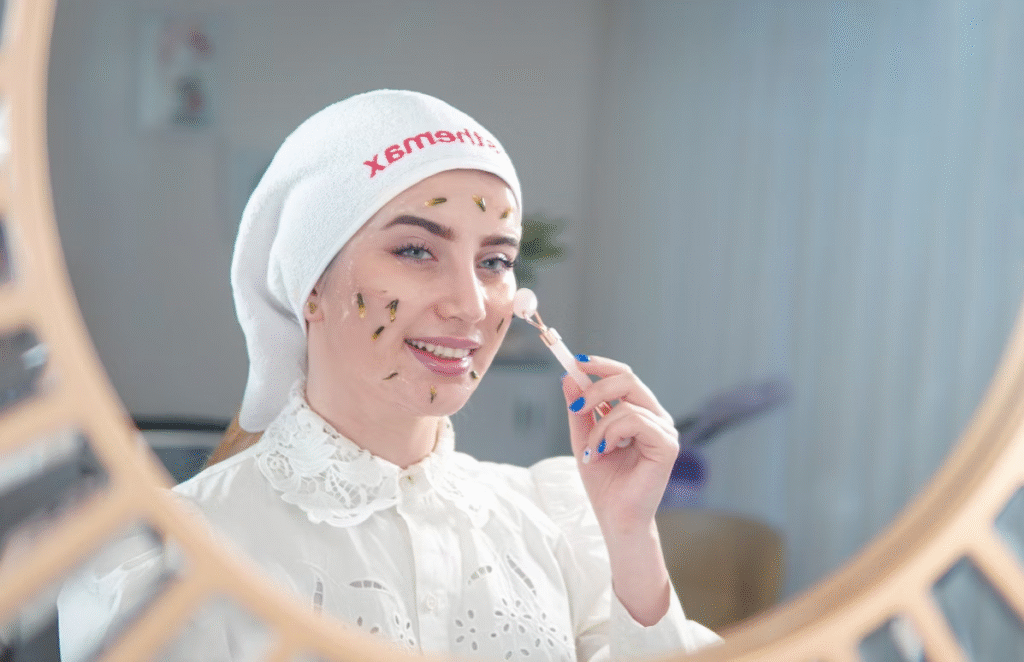Achieving lasting healthy skin requires more than just good genes. It involves a comprehensive approach that combines proper care, nutrition, and lifestyle adjustments. By incorporating certain habits into your routine, you can help your skin stay radiant and youthful for years to come.

Importance of a Consistent Skincare Routine
Establishing a consistent skincare routine is foundational to maintaining healthy skin. Consistency allows you to treat and protect your skin effectively. A simple regimen involving cleansing, toning, and moisturizing can make a significant difference. When choosing products, look for those tailored to your skin type, whether oily, dry, or combination.
Using a gentle cleanser suited to your skin type will help remove dirt and impurities without irritating. After cleansing, toners can help balance the skin’s pH and prepare it for the next steps in your routine. The final step, applying moisturizer, hydrates and locks in moisture while providing critical nutrients. Look for a moisturizer with Manuka honey benefits, which offers soothing and healing properties. Incorporating sunscreen into your morning routine is vital to protect against UV damage, even on cloudy days.
Consistency is about daily use and about avoiding frequent changes in products, as this can cause irritation or disrupt your skin’s balance. Tracking how your skin responds to products over several weeks can help you identify what works best. Seasonal changes may require slight adjustments, such as switching to a richer moisturizer in winter or a lighter formula in summer. These habits create a stable foundation for healthy, resilient skin.
Adopting a Balanced Diet for Skin Health
Your diet plays a key role in how your skin looks and feels. A balanced intake of vitamins, minerals, and antioxidants helps nourish and protect your skin from environmental stressors. Foods rich in vitamin C, like oranges and berries, support collagen production, giving your skin firmness and elasticity.
Including omega-3 fatty acids found in fish like salmon can enhance your skin’s barrier function. Hydration is equally important, as drinking enough water flushes out toxins and keeps skin cells plump. Aim to consume a variety of colorful fruits and vegetables to ensure you’re getting a range of nutrients beneficial for skin health.
Staying Hydrated for a Natural Glow
Water intake significantly influences skin health. Hydration helps maintain the skin’s elasticity and suppleness. Dehydrated skin often appears dull and prone to fine lines. Make it a habit to carry a water bottle to track your daily intake. Aim for at least eight 8-ounce glasses of water daily, adjusting according to your activity level and climate.
In addition to plain water, other sources of hydration, such as herbal teas and water-rich fruits like cucumbers, can contribute to your fluid intake. Staying hydrated helps eliminate toxins from the body, resulting in healthier skin.
Protecting Skin from Sun Damage
The sun’s rays can cause significant damage to your skin, leading to premature aging and an increased risk of skin cancer. Protecting your skin from UV damage is critical in any skincare regimen. Daily application of broad-spectrum sunscreen, even on cloudy days or indoors, is important. Aim for SPF 30 or higher. Reapply frequently after swimming or sweating.
Wearing protective clothing and seeking shade during peak sun hours can further reduce your risk of sun damage. Incorporating antioxidants, like vitamin E and green tea extract, can offer additional protection by neutralizing free radicals caused by UV exposure.
Managing Stress for Better Skin
Chronic stress negatively impacts skin health, leading to conditions such as eczema, acne, or rosacea. Finding effective ways to manage stress is vital for maintaining a healthy complexion. Engaging in activities like yoga, meditation, or deep breathing exercises can promote relaxation and reduce stress levels.
Regular physical activity releases endorphins, which naturally improve mood and can help combat skin issues related to stress. Setting aside time for hobbies and social connections can further contribute to a well-rounded approach to stress management, benefiting both mental and skin health.
Regular Exercise for Skin Vitality
Physical activity plays an important role in health, including skin appearance. Exercise increases blood circulation, which helps deliver oxygen and nutrients to skin cells while removing toxins. Sweating during a workout can help clear out clogged pores, reducing the likelihood of breakouts.
Incorporating a mix of cardiovascular exercises, strength training, and flexibility workouts into your routine offers a comprehensive approach to fitness. Consistency is key, so find an activity you enjoy to make it easier to maintain your exercise habits long-term.
Adequate Sleep for Skin Repair
Quality sleep is important for skin rejuvenation. During sleep, your body goes into recovery mode, repairing damaged cells and replenishing nutrients. Aim for seven to nine hours of quality sleep each night to optimize this process. Lack of sleep can lead to the appearance of dark circles, fine lines, and a lackluster complexion.
Establish a calming nighttime routine to signal to your body that it’s time to wind down. Techniques such as reading, light stretching, or even a cooldown shower can enhance your ability to relax and fall asleep more easily. Limit exposure to screens before bedtime, as blue light can interfere with your body’s natural sleep-wake cycle.

Regular Skin Examinations
Keeping regular appointments with a dermatologist helps track skin health and allows for early detection of potential issues. Dermatologists can provide tailored advice based on your skin type, history, and concerns. Regular evaluations help in adjusting your skincare routine to meet your evolving needs with changing seasons or life stages.
Routine skin examinations are particularly important in spotting any irregularities or signs of skin cancer early on. Establishing a reliable relationship with your skincare professional can help you stay informed about best practices and newer products or treatments.
Maintaining long-lasting, healthy skin is the result of consistent effort, mindful choices, and an understanding of what your skin truly needs. By combining a steady skincare routine with a nutrient-rich diet, proper hydration, sun protection, stress management, regular exercise, adequate sleep, and professional checkups, you create a comprehensive plan for skin wellness.














